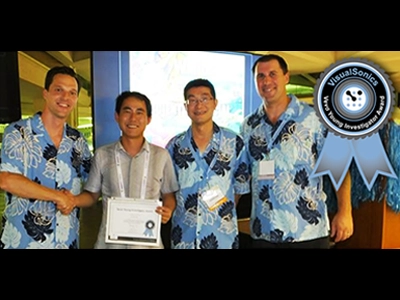
Shared by Dr. Peng Huang
Dr. Peng Huang presented his work on the development of a clinically translatable cancer theranostic agent at the World Molecular Imaging Conference in Hawaii. This therapy uses a near-infrared (NIR) cyanine dye and human serum albumin (HSA) conjugate for NIRfluorescence/photoacoustic/thermal multimodality imaging and photothermal tumor ablation. This work was supported by the Intramural Research Program (IRP) of the National Institute of Biomedical Imaging and Bioengineering (NIBIB), National Institutes of Health (NIH).
Learn more about theranostic agent development, published in ACS Nano.
Dr. Peng Huang received his Ph.D. in Biomedical Engineering from the Shanghai Jiao Tong University, China in 2012. He then joined the Laboratory for Molecular Imaging and Nanomedicine (LOMIN) at the National Institute of Biomedical Imaging and Bioengineering (NIBIB) as a postdoctoral fellow under the supervision of Dr. Xiaoyuan (Shawn) Chen. In recent years Dr. Huang has focused on the design, synthesis, and biomedical applications of functional nanomaterials.
His research interests include:
- Methods of controlled nanomaterial synthesis
- Self-assembly of functional nanomaterials for drug delivery, biological study, imaging and therapy, and
- Development of theranostics capable of being activated for tumor imaging and targeted therapy
Since 2011, Dr. Huang has authored over 10 peer-reviewed papers using the Vevo Imaging System (Vevo 2100 LAZR), many of which were published in top chemistry, materials and biomedicine journals: Adv. Mater., JACS, Angew. Chem. Int. Ed., ACS Nano, Biomaterials, etc.
Recently, he has developed a clinically translatable cancer theranostic agent based on near-infrared (NIR) cyanine dye and human serum albumin (HSA) conjugate, for NIR fluorescence/photoacoustic/thermal multimodality imaging and photothermal tumor ablation. This work was supported by the Intramural Research Program (IRP) of the National Institute of Biomedical Imaging and Bioengineering (NIBIB), National Institutes of Health (NIH).